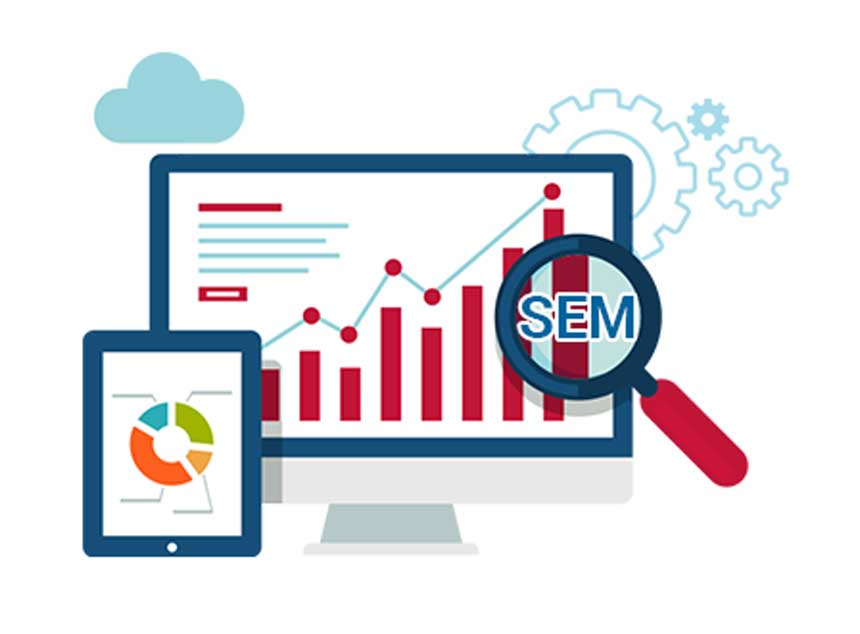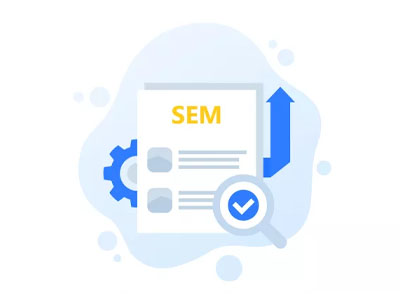
Search Engine Marketing (SEM) is a digital marketing strategy that involves promoting websites by increasing their visibility in search engine results pages (SERPs) through paid advertising. SEM primarily focuses on paid search advertising, commonly referred to as Pay-Per-Click (PPC) advertising.
Key components of Search Engine Marketing (SEM) include:

This involves bidding on keywords relevant to your business to display ads on search engine results pages (SERPs). Advertisers pay a fee each time a user clicks on their ad (PPC model), driving traffic to their website.
SEM allows the use of ad extensions, such as sitelink extensions, call extensions, location extensions, and more, to enhance the visibility and relevance of ads and provide additional information to users.
SEM campaigns are built around specific keywords or search queries that potential customers are likely to use when looking for products or services. Keyword targeting helps ensure ads are shown to a relevant audience.
Advertisers set daily or monthly budgets for their SEM campaigns, controlling how much they are willing to spend on clicks and conversions. Budget management is crucial for optimizing campaign performance and ROI.
SEM platforms like Google Ads provide robust analytics and reporting tools to track campaign performance, including impressions, clicks, conversions, and return on investment (ROI). This data helps optimize campaigns and allocate budget effectively.
Search Engine Marketing (SEM) is essential for businesses looking to maximize their online presence, reach targeted audiences, and drive measurable results. One of the key reasons SEM is crucial is its ability to deliver immediate visibility on search engine results pages (SERPs) through paid advertising. With SEM, businesses can bid on relevant keywords related to their products or services and have their ads displayed prominently to users actively searching for those keywords. This targeted approach ensures that businesses connect with potential customers at the right moment, increasing the likelihood of conversions and sales.
Furthermore, SEM offers precise audience targeting based on demographics, location, interests, and search intent. This targeted advertising helps businesses optimize their marketing spend by reaching the most relevant audience likely to convert. Unlike traditional advertising methods, SEM operates on a pay-per-click (PPC) model, meaning businesses only pay when users click on their ads, making it a cost-effective way to drive traffic and generate leads.

Keyword research and strategy in SEM involve identifying relevant search terms, analyzing user intent, and selecting high-value keywords to target in paid search campaigns. This process ensures optimized ad targeting, improved Quality Score, and increased ROI for SEM initiatives.
Amazon PPC (Pay-Per-Click) in SEM allows sellers to promote their products directly on Amazon search results and product detail pages, targeting shoppers actively searching for related products. With Amazon PPC, sellers can increase product visibility, drive traffic to product listings, and boost sales by bidding on relevant keywords and paying only when shoppers click on their ads.
Video advertising in SEM involves creating engaging video ads that appear on platforms like YouTube or within other video content across the web. These ads can help businesses reach a broad audience, convey their message visually, and drive brand awareness and conversions effectively.
eCommerce advertising in SEM involves targeting relevant keywords related to products, optimizing product listings, and using shopping ads to showcase products directly on search engine results pages (SERPs) to drive qualified traffic and increase sales. By leveraging SEM for eCommerce, businesses can reach a highly targeted audience actively searching for products, leading to improved conversion rates and revenue.
Social media paid advertising in SEM involves leveraging platforms like Facebook, Instagram, Twitter, or LinkedIn to promote products or services through targeted ads. By utilizing demographic and interest-based targeting, businesses can reach specific audiences and drive engagement, leads, and conversions effectively.
Landing page conversion in SEM is critical for maximizing campaign success. Optimizing landing pages with compelling content, clear calls-to-action (CTAs), and streamlined user experience can significantly increase conversion rates and drive ROI.
Paid search advertising in SEM involves bidding on specific keywords relevant to your business to display ads prominently on search engine results pages (SERPs), driving targeted traffic to your website. This pay-per-click (PPC) model allows you to reach potential customers actively searching for products or services like yours and only pay when users click on your ads.
Ads A/B split testing in SEM involves creating variations of ad elements (such as headlines, copy, or visuals) to test which performs better in terms of click-through rate (CTR) or conversion rate. By systematically comparing different ad versions, businesses can optimize campaign performance and maximize ROI in search engine marketing.
SEM PPC management involves optimizing pay-per-click advertising campaigns to maximize ROI by refining keyword targeting, ad copy, bidding strategies, and budget allocation based on data-driven insights and performance metrics. Experienced SEM specialists continuously monitor and optimize campaigns to drive qualified traffic, increase conversions, and achieve business goals effectively.
Managing Bing and Google Ads in SEM involves optimizing campaigns for maximum visibility and ROI. Our services include keyword research, ad creation, bid management, and performance monitoring to ensure effective targeting and campaign success across both platforms.
Remarketing in SEM involves targeting users who have previously interacted with your website or mobile app by displaying relevant ads to them across the web or on social media platforms, encouraging them to return and complete desired actions. It's an effective strategy to re-engage potential customers and improve conversion rates by staying top-of-mind with personalized and targeted advertisements.
Search Engine Optimization (SEO) in SEM focuses on optimizing website content, structure, and performance to improve organic search engine rankings and increase visibility. By complementing PPC campaigns with SEO efforts, businesses can enhance overall online presence and drive sustainable, long-term traffic to their websites.
©2015 ALL RIGHT RESERVED. DESIGNED BY Success Sign Consulting Private Limited